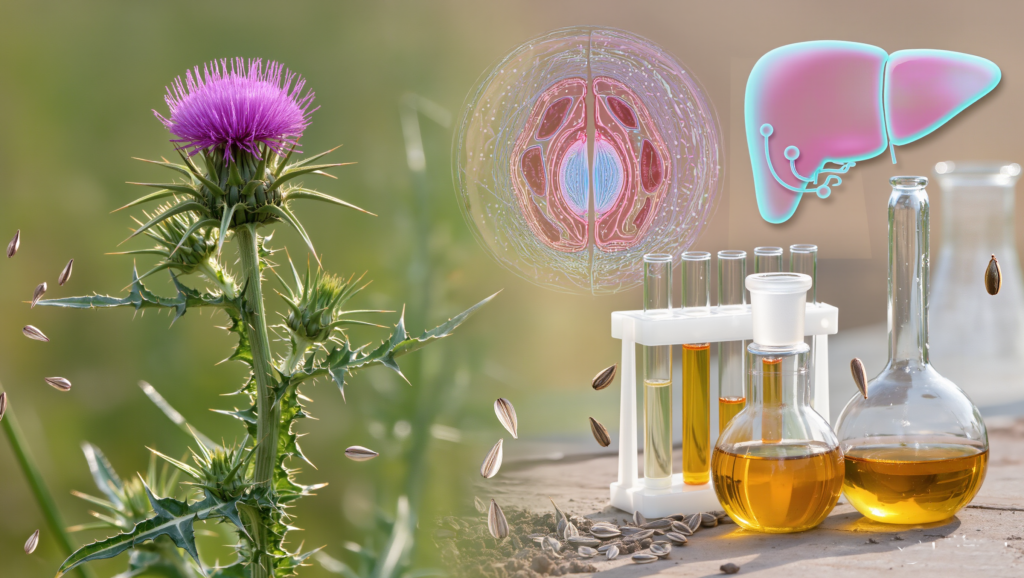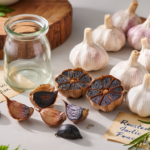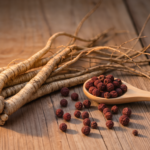Milk thistle (Silybum marianum) has held a storied reputation as a liver-healing miracle in both ancient and modern herbal medicine. With origins stretching back over 2,000 years in Europe and the Mediterranean, this spiky, purple-thistle plant found its way into the hands of Greek physicians, medieval monks, and, today, health-conscious people being bombarded by toxins, pharmaceuticals, and the “modern lifestyle.” But does milk thistle really live up to the hype as the ultimate liver protector? Let’s separate the science fact from fiction in the world of milk thistle—and discover what the latest studies actually say about this popular herbal supplement.
The Traditional Reputation of Milk Thistle
Long before clinical trials or supplement aisles, healers used milk thistle as a liver tonic, antidote to poisoning, and cure-all for jaundice. The seeds and fruit are the most potent parts. In folklore, its milky-white-veined leaves were credited with breaking “liver stagnation,” cleansing bile, and helping everything from brain fog to menstrual disorders. Fast-forward to today, and you’ll see milk thistle promoted as a natural antidote to alcohol abuse, pharmaceutical overload, hepatitis, and environmental stress.
Milk Thistle’s Key Ingredient: Silymarin
The primary reason for milk thistle’s healing fame is silymarin, a complex of flavonolignans (including silybin, silydianin, and silychristin). Silymarin is a powerful antioxidant, able to neutralize the damaging free radicals that wreak havoc on liver cells. It also has anti-inflammatory, antifibrotic, and regenerative properties.
How Silymarin Works
- Antioxidant Power: Silymarin scavenges reactive oxygen species and prevents lipid peroxidation (a key factor in liver cell damage).
- Membrane Stabilization: It helps reinforce liver cell membranes, blocking toxins from entering and causing damage.
- Protein Synthesis: Silymarin may increase ribosomal RNA polymerase, stimulating the production of new proteins necessary for cellular repair.
- Anti-Fibrotic and Anti-Inflammatory: By inhibiting inflammatory pathways and fibrogenic signals, it helps slow scarring and chronic liver disease progression.
- Glutathione Booster: Silymarin improves cellular levels of glutathione, the body’s main detoxifier and antioxidant, especially in the liver.
Milk Thistle In Modern Science: What Do the Studies Say?
1. Liver Disease & Cirrhosis
Several well-conducted clinical trials indicate that silymarin can lower liver enzyme markers (often a sign of damage), stabilize liver function, and improve symptoms in people with chronic liver disease, alcoholic liver disease, or cirrhosis. Patients taking milk thistle often have reduced fatigue, jaundice, and malaise, and higher survival rates (especially when taken early in the disease course).
- Meta-analyses of dozens of studies found silymarin to provide modest but significant improvements in liver enzymes (ALT, AST), and reduce progression of fibrosis and cirrhosis in alcoholic and non-alcoholic fatty liver disease.
2. Hepatitis (Viral and Toxic)
Milk thistle has a long track record as a traditional anti-hepatitis remedy, and several modern trials show benefit as an adjunct to standard treatments in hepatitis B and C. While not a cure or primary treatment, silymarin can reduce oxidative stress and inflammation, and support overall liver health in hepatitis patients.
3. Drug and Alcohol-Induced Liver Injury
One of milk thistle’s most validated uses is in toxin- or drug-induced liver damage: acetaminophen, chemotherapy agents, anti-TB drugs, or the long-term effects of alcohol. Animal and some human studies show reduced liver cell death, improved enzyme markers, and accelerated recovery when silymarin is administered.
- Milk thistle is even a reference herbal supplement for mushroom poisoning (from Amanita phalloides), though hospital treatment is always required in severe cases.
4. Non-Alcoholic Fatty Liver Disease (NAFLD)
NAFLD—now epidemic due to modern diets—has been studied extensively with milk thistle. Several trials have found silymarin, often combined with vitamin E or phosphatidylcholine, reduces fat accumulation, inflammation, and liver enzyme markers in people with NAFLD, with rare adverse events.
Beyond the Liver: Added Benefits of Milk Thistle
Research has linked silymarin to a variety of broader health improvements:
- Blood sugar regulation: Some studies show improved insulin sensitivity and lower fasting blood sugar in metabolic syndrome/diabetes patients.
- Anticancer potential: Early lab research suggests silymarin may limit cancer cell growth or increase effectiveness of chemotherapy drugs, though robust human studies are lacking.
- Skin health: Milk thistle’s antioxidant power helps protect skin from UV-induced damage and speeds up healing in dermatological conditions.
What About The Naysayers? Science Fiction, Overblown Claims, and Limitations
It’s important to know where the evidence stops:
- Milk thistle is not a “cure all.” It cannot reverse advanced cirrhosis, cure hepatitis, or substitute for medical therapy in severe disease.
- Benefit varies: Some people respond much better than others—likely due to genetic, dietary, and disease-specific factors.
- Supplement quality matters: Potency and purity vary dramatically; only standardized silymarin extracts (preferably 70-80% silymarin content) have been shown in trials to be effective.
How To Use Milk Thistle for Liver Support
- Typical dose: 200–400 mg of standardized silymarin extract (70-80% silymarin), once or twice daily with meals.
- Forms: Capsules, tinctures, or teas.
- Best for: Support after alcohol/drug exposure, chronic health conditions (e.g. NAFLD, mild hepatitis), long-term polypharmacy, or as gentle preventive care for liver wellness.
- Safety: Generally well-tolerated; minor side effects can include stomach upset or mild allergic reaction. Check with your healthcare professional before combining with medications.
Bottom Line: Milk Thistle Is Science-Backed—But Not a Miracle Fix
Despite some overblown marketing, milk thistle is one of the best-studied, safest natural remedies for liver support, with a real—if not magical—track record for reducing mild liver inflammation, supporting detoxification, and protecting against some modern liver threats. When paired with a healthy lifestyle and medical guidance for serious issues, it’s an excellent addition to a liver-friendly regimen.
If you’re considering milk thistle or other herbal supplements for liver health, consult with a knowledgeable physician or integrative medicine practitioner for dosage and brand guidance—and always prioritize the basics: real food, regular activity, and moderation of toxins.
Did you find this article helpful? Support us by following us on our social media pages—Youtube, Instagram, Facebook, Pinterest, Twitter (X))—and stay up to date on other exciting topics related to natural health and wellness.








